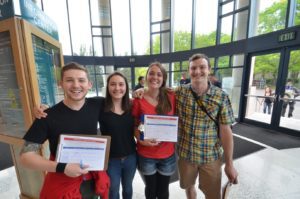At RE Sources, we believe civic engagement is our right, privilege, and collective responsibility — to remain informed and be a part of the decisions being made in our communities. The decisions made in local and state-level elections will directly affect our everyday lives, whether we realize it or not. We have great power as individuals to positively impact our communities by voting, communicating with our elected officials, and engaging in public processes.
Most people don’t have time to study up on the myriad policy issues that affect us. That’s why our staff of policy analysts, scientists, and educators pay close attention to the complex public processes and policies that govern how our communities operate. We help you, the voters, understand what is happening and how you can make your voice heard.
No, we don’t back candidates.
We care about the issues at stake — climate change, water quality, protecting forests and farmlands, protecting threatened and endangered species, availability of potable water, community health and safety, jobs and local economies — not about party lines or individual candidates. We never endorse, back, campaign for, or electioneer any candidates — It is illegal to do so as a 501(c)(3) nonprofit. See the FAQ tab of this page to view nonprofits’ legal limitations during elections.
 Get Out the Vote
Get Out the Vote
As one of our civic engagement efforts, RE Sources leads Get-Out-the-Vote campaigns to register voters and encourage voting in local elections. In addition to ensuring young people, newcomers, and other underrepresented groups are registered to vote, we aim to inspire Whatcom County residents to take part in elections and ensure that we have high voter turnout in every election.
They may not be as exciting or high-profile as the U.S. Presidential primaries, but county-level elections are a great opportunity to make real change. Local elections have a tremendous impact on the everyday life of residents, and are often won by a small handful of votes. City and County Councils can act on issues such as affordable housing, education, protection of natural resources, land use planning, and more.
Voter education
It’s important that voters guard against misinformation, ignorance, and willful manipulation to prevent being misguided by candidates, elected officials, and private interests. The best defense voters have is to go beyond opinions and ideas, and equip themselves with non-partisan, fact-based information. That is what RE Sources provides to our communities. We host candidate forums and educational meetings, and we distribute educational materials on public policy issues that affect the health of people and the environment. We make it easy for our community to access information that empowers their civic engagement.
Our position is non-partisan — we endorse the environment, not political candidates or parties.
Public processes
Those who are affected by a decision have a right to be involved in the decision-making process. This is a vital democratic function. Public participation opportunities exist everywhere in our government’s policy and decision making processes.
Public participation is a process, not a single event. It consists of a series of opportunities, sometimes over the course of years, to inform and gather input from the public on a policy or project that could impact our community. It can mean submitting a comment on a proposed project, contacting your legislators to share your viewpoint on a bill being presented, or providing your special expertise to help enrich governmental decisions.
Public participation in government processes not only provides people the opportunity to influence decisions that affect their lives — it’s a critical check and balance to ensure the public’s will is being accurately represented. Public processes offer a powerful invitation for civic engagement.
Photo at top by Rachel Lee, WEC

 Get Out the Vote
Get Out the Vote